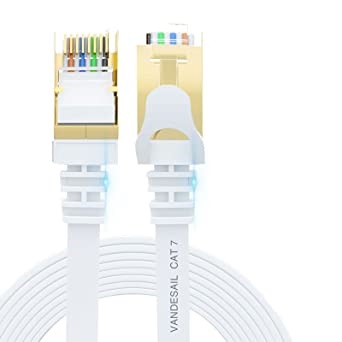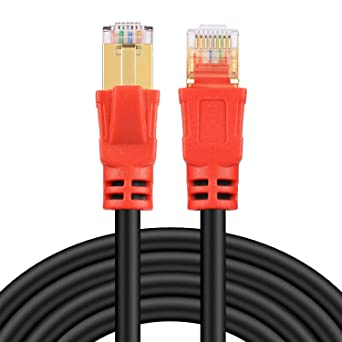Keeping that in mind, if you look into the market and start searching for Ethernet cables, you’ll find cables of various different categories such as CAT5, CAT5e, CAT6, CAT6a, CAT7, and CAT8, etc. Without a doubt, you should be picking the latest generation cables as they are known to perform better. But, since CAT7 and CAT8 cables are both in trend these days, which one should you pick? We’ll tell you!
Cat 7 Cables:
The CAT7 cables came up with huge improvements over the previous generations in terms of both data transfer rates and performance. The Category-7 cables are usually shielded for better noise resistance and attaining high frequency. Compared to the 250MHz frequency of CAT6 cables, CAT7 cables work at 600MHz frequency, which allows the cable to reach up to 10 Gbps data transfer rates even at a 100m distance range. Hence, if you are setting up a LAN connection in an office environment, the CAT7 cables are one of the best choices you can make.
Pros And Cons:
Cat 8 Cables:
The Category-8 cables, aka CAT8, are the most modern Ethernet cable standard, which is actually the best as of now. Although the CAT8 cables are quite expensive, they do offer a worthy experience as well. Unlike CAT7, the CAT 8 cables use a 2 connector channel, with a frequency of up to 2000MHz, which is much faster than all previous generation cables. However, the distance of the CAT8 connections is limited to 30m, but with a massive data transfer rate of up to 25Gbps/40Gbps. Speaking of its design and construction, they are much similar to other cables but generally come with shielding for better quality transmission.
Pros And Cons:
Cat 7 Vs Cat 8 Comparison Table
Cat 7 Vs Cat 8 Comparison
When it comes to the comparison between CAT7 and CAT8 cables, both the cables have their own perks and several disadvantages as well. To give you a clear view about this, we will be comparing both CAT7 and CAT8 based on various factors that’ll help you know which one of these cables will work best for you.
Performance
As far as the performance is considered, it is pretty obvious that the modern one is better. The CAT8 cable works at a higher frequency up to 2GHZ or 2000MHz, whereas the CAT7 cables operate on 600MHz. Thus, this frequency difference between the cables also affects their respective data transfer rates as well. While the CAT 8 cables can deliver speeds up to 40 Gbps max, the CAT7 cables are limited to 10 Gbps only.
Maximum Cabling Length
In terms of cabling length, the CAT8 cables and CAT7 cables are pretty different from each other. We would say, if you want to set up a long connection, the CAT7 cables support up to 100m in length, providing up to 10 Gbps constant speed. On the other hand, with the CAT8 cables, you can only set up a connection up to 30-40 meters max, but with a fast transmission rate of up to 40 Gbps. So, that’s a limiting factor about CAT8 cables, but they are actually good for personal use.
Connectors
Speaking of CAT7 cables, these ones use a channel that includes 4 connectors where the cabling is well-shielded for noise resistance. The connector type used in CAT7 cables is a non-RJ45 connector, and these CAT7 connections generally account for extra expenses during installation as modern testing equipment is required to test these cables. On the other hand, CAT8 cables use RJ45 connectors for Class I cables, and non-RJ45 connectors for Class II cables. As compared to CAT7, they use channels with 2-connectors only. However, no matter which CAT8 cable you use, they are backward compatible and can be used with any device without any issue.
Shielding
The CAT7 cables generally have shielded twisted pairs of cables inside the main jacket, which makes the overall connection more stable and helps in eliminating the crosstalk. On the other hand, the CAT8 cables are not very much different than CAT7 as they also have shielded twisted pairs of cables inside providing improvement up to 15 dB in reducing alien crosstalk. In fact, if you look at the construction of a CAT8 cable, it resembles a CAT5 or CAT6 shielded design, but with different connectors.
Conclusion
We hope you have understood all the major differences between the CAT7 and CAT8 cables so far. In terms of performance, we believe that both the cables are quite good as 10 Gbps is not at all considered to be slow. However, if you want to experience the best, the CAT8 cables can provide you a great internet experience. While both the cables perform so well, the CAT8 cables are pretty expensive and have a limited length as well. In that case, you can consider CAT7 cables instead as they have much better cabling length which is good for large-area applications. That’s it from our side, but we are also interested in knowing what you think about these cables. So, don’t forget to share your thoughts in the comments section below. Comment * Name * Email * Website
Δ







![]()